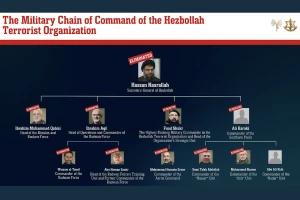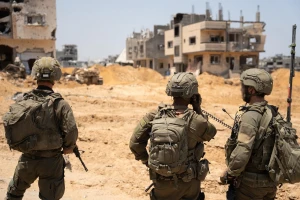Tehran is reportedly rearming terrorist proxies following Israeli and US strikes on Iran

The Iranian regime is reportedly stepping up efforts to rearm its weakened terrorist proxies across the Middle East, the Wall Street Journal reported on Friday. The move comes after Israel and the United States severely damaged Iran’s nuclear and military infrastructure last month. Israel also dealt a major blow to Iran’s military leadership by eliminating dozens of top generals and senior nuclear scientists involved in Tehran’s clandestine nuclear weapons program.
Iran officially denies reports that it is rearming its proxies. Foreign Ministry spokesman Esmail Baqaei dismissed claims of new weapons shipments to the Iran-backed Houthi terrorist militia in Yemen as “baseless.” However, the Iranian regime has a history of denying activities that were later confirmed – such as its efforts to develop nuclear weapons by enriching uranium to near-military levels.
With the Iranian-backed terrorist group Hamas in Gaza increasingly isolated and severely weakened, Tehran is reportedly shifting its focus to rearming its primary proxies: Hezbollah in Lebanon and the Houthis in Yemen. Iran has long relied on these groups to threaten Israel, expand its regional influence, and offset its limited conventional military capabilities.
Earlier this week, forces aligned with Yemen’s internationally recognized government intercepted a large shipment of advanced military equipment destined for the Houthis. The shipment reportedly included drone parts, missiles, and warheads, and according to The Wall Street Journal, was concealed beneath a false load.
Mohammed al-Basha, the founder of the Basha Report, a US-based Middle East security advisory, assesses that Tehran seeks to replenish the Houthi’s depleted stockpiles of missiles and drones.
"The timing and scale of this shipment strongly suggest Iran is moving quickly to replenish Houthi stockpiles depleted by US airstrikes," al-Basha said.
Meanwhile, Iran has accelerated its efforts to rearm its ally Hezbollah in Lebanon. Once considered the world’s most powerful non-state actor, Hezbollah has been severely weakened by the Israeli military following its unprovoked attack on northern Israel on Oct. 8, 2023. In late 2024, the IDF eliminated much of Hezbollah’s senior leadership, including its top commander Hassan Nasrallah. Israeli forces also killed several thousand Hezbollah operatives and destroyed large portions of the group’s missile and drone arsenals, which had posed a significant threat to Israeli security.
“Iran is rebuilding its presence in the Levant by sending missiles to Hezbollah and weapons from Iraq to Syria. This arms trade is part of Iran’s continued ambition to sustain its influence in the region,” explained Michael Knights, a senior fellow at the Washington Institute for Near East Policy.
However, Iran’s efforts to rearm Hezbollah are being undermined by both Israel and the new Syrian Al-Sharaa-led Sunni regime, which is an ideological rival to Iran’s Shiite ayatollahs.
"There has been an intensifying trend in recent months of smuggling attempts originating from or transiting through Syria to Lebanon’s Hezbollah,” said Michael Cardash, a former deputy head of Israel's bomb disposal division.
Furthermore, the new American-backed Lebanese government is reportedly stepping up its efforts to weaken Hezbollah’s malignant influence in the country and is actively trying to disarm the Iranian-backed terrorist militia.
Earlier this month, U.S. envoy to Lebanon Tom Barrack praised Lebanon’s efforts to disarm Hezbollah.
"What the government gave us was something spectacular in a very short period of time. I'm unbelievably satisfied with the response,” Barrack stated.
While severely weakened, Hezbollah has indicated that it will not voluntarily disarm its forces.

The All Israel News Staff is a team of journalists in Israel.
You might also like to read this:










